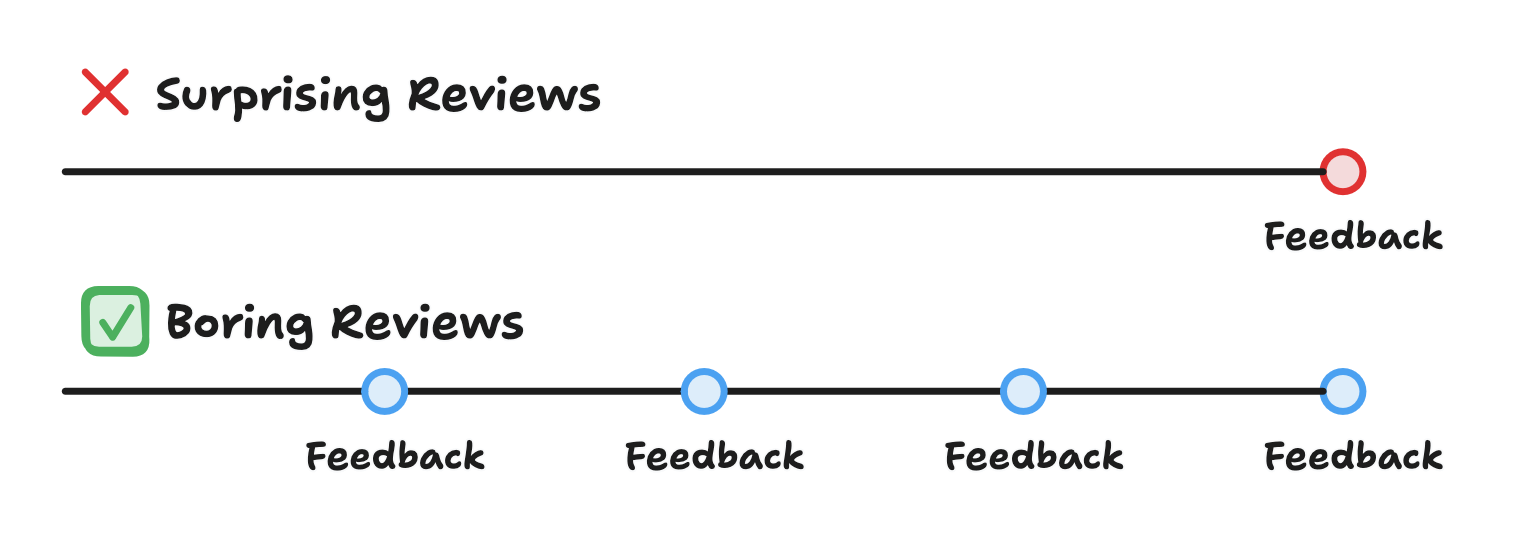The Art of Being a Boring Leader
Throughout my career, I've always valued performance reviews and feedback about my work. I distinctly remember a particularly frustrating instance. It was a mid-year conversation rich of good growth opportunities. Why was I frustrated then? It was all delivered too late and sounded mostly new to me. It didn’t make sense to let me continue on the wrong path that could have been corrected months prior.
My Core Philosophy on Feedback
It took me just one experience to determine how to shape my management philosophy: performance reviews should be boring.
While they're a formal process that needs to align with company guidelines, if you get to a performance review with surprising feedback, your manager has failed. This philosophy works both ways - it's a partnership between managers and individual contributors.
Making This Work: A Two-Way Street
As an Individual Contributor
You need to seek feedback regularly. Use your 1:1s to check in with your manager about:
- Whether your approach to problems aligns with expectations
- How you're leading projects
- If you're meeting performance standards
By staying in continuous alignment with your manager on what "good" looks like and asking for specific feedback (e.g. meetings, projects, code reviews), you can adjust your behavior throughout the year rather than waiting six+ months.
As a Manager
I've learned to note down growth opportunities almost daily. It's crucial to build this habit and surface your findings as soon as possible. When I see behaviors that don't align with role expectations, I address them promptly while the experience is fresh.
I prefer giving people time to process feedback - not everyone digests it the same way. I try to share my input a day ahead so they can think it over and come prepared to discuss how they could improve. Instead of providing immediate solutions, I help them understand what meeting and exceeding expectations looks like in instances where they could have done better.
Why Surprises Might Happen
In my experience, I’ve seen a few situations where surprises made their way into a performance review:
- First Performance Review You're still getting to know each other. Behaviors might build up to a pattern that only becomes visible when looking at the whole period. While this shouldn't come as a shock, seeing everything put together might be somewhat surprising.
- This should not be an excuse! You can mitigate it by doing “mid performance review check-ins”. This should push both parties to reflect on the previous X months. Some patterns might already come to light that can be discussed.
- Poor Communication You might find yourself writing a review with new growth opportunities that haven't been previously discussed. I've made this mistake early in my career when I had more reports than I could effectively manage. It was an immediate learning lesson, and I promised myself not to repeat it.
- You should put in place systems that allow you to have more visibility on your team. Take notes regularly and discuss directly with your reports.
Making Reviews Less Stressful
By addressing things continuously, performance reviews become less stressful for both parties. It shouldn't be a moment of panic where you're trying to remember everything you've done. Instead, it should be a time to compile the notes you've collected through 1:1s and succinctly highlight:
- Completed projects
- Accomplishments
- Growth opportunities
- Progress made on previous growth areas

A Call to Action
If you receive a performance review with surprises, you need to have a tough conversation with your manager. Your growth and career progression depend on it. Find a system that works well for both of you to ensure there’s no unexpected feedback moving forward.
Remember, managers are people too. I've made some of these mistakes! When I had more reports than I could handle, things slipped through the cracks and I had a hard time keeping up. These experiences taught me valuable lessons about the importance of consistent communication.
Don't wait for 1:1s or performance reviews to give or receive important feedback. Make feedback and growth a consistent part of your communication. This way, when you get to the performance review, you can focus on patterns and overall progress rather than surprising new information.
The best performance reviews are boring ones - where you can look back on the continuous dialogue about achievements and growth opportunities, and use this time to plan for future development.
Parting Thought
To be candid, I felt robbed when I wasn’t given the chance to course-correct before the performance review. It seemed unfair, but it was an honest mistake from my manager.
Don’t be shy in leading upwards and expecting more from your manager. I could have delivered more and better have I known I was falling short. Nobody wins when we wait too long to seek or give feedback.